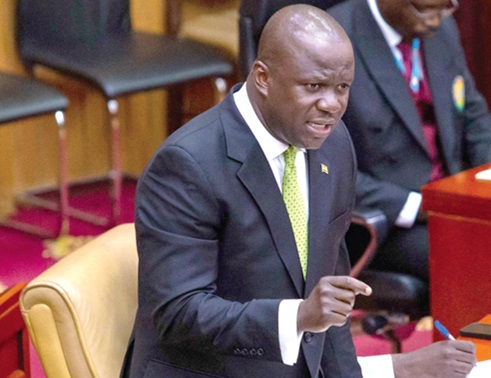
Clerk to Parliament’s residence was sold in 2015 - Lands and Natural Resources Minister tells Parliament
The Minister of Lands and Natural Resources, Samuel Abu Jinapor, has told Parliament that the residence of the current Clerk to Parliament was sold to a private developer in 2015 and not 2019.
He said his checks at the Lands Commission showed that the Clerk’s accommodation or residence was given out during the era of the previous administration.
“The then Minister of Works and Housing gave an offer to a private developer in 2015 and a lease was granted to the developer in 2015,” he said.
Unimpeachable records
Contributing to a debate on the motion for the House to approve the 2024 Budget statement on the floor of Parliament yesterday, Mr Jinapor said, “these records at the Lands Commission are unimpeachable as it happened in 2015.
“It just so happened that the developer, having bought the land in 2015, having been given an offer letter in 2015 and having been granted a lease in 2015, took possession in 2019.
“So, by all intent and purposes, the land was sold in 2015 and not in 2019,” he submitted.
Parliament’s call
Last Wednesday, the Parliamentary Service stated that there was an attempt to sell the official residence of the Speaker of Parliament at Cantonments in Accra and, therefore, welcomed the decision by the Ministry of Lands and Natural Resources to investigate who made the alleged attempt.
In a press release dated Wednesday, November 22, 2023, supporting what the Speaker said last Monday, the Parliamentary Service explained, "the potential buyer proceeded to the Lands Commission for the necessary due diligence and realised the status of the property. That was when Mr Speaker got to know about it," it said.
It said, "the reactions by the Ministry of Lands and Natural Resources, the Ministry of Works and Housing and the Lands Commission so far have not tackled the subject matter of the alleged sale."
UNESCO building not sold
But reacting to the call for an investigation by Parliament, Mr Jinapor advised those who had been making sweeping statements that various lands had been sold to guard against such utterances.
For instance, he said it was not true that the UNESCO building close to the Police Headquarters in Accra had been sold.
He said the repository of lands in the country, by law, was vested in the Lands Commission.
“UNESCO is still occupying their premises close to the Police Headquarters so the claim that the UNESCO building is sold is false.
“Mr Speaker, UNESCO land has not been sold and it is in possession of its land,” he said.
Dwelling on the mining sector, Mr Jinapor said in such a time of unprecedented global crisis, the President and his government had made the right consequential choices for the country’s progress.
The minister mentioned the implementation of the gold-for-oil programme along domestic gold purchase programme by the central bank to shore up the reserves of the Bank of Ghana (BoG).
He said today, the gold reserves of the BoG had become stronger, aiding the country to secure over 800,000 tonnes of crude oil.
Mr Jinapor said almost 30 per cent of the national crude oil consumption had been purchased through such a policy without the country having to use dollars to import oil.
“Since the inception of the gold-for-reserve programme, the BoG has purchased a total amount of 17.89 tonnes at $140 million into its gold reserves,” he said, quoting the 2024 budget document.
He said that intervention, which was an initiative of the Vice-President, had led to a reduction in exchange rates and the prices of fuel.
He indicated that gold alone contributed $4.67 billion in exports in August 2023 compared with $3.46 billion in June 2023.
For 63 years as a nation, he said it was the first time that Ghana’s GDP would cross GH¢1 trillion.
With the investment that had been put in the mining sector, Mr Jinapor said the sector would contribute strongly to the national economy to help achieve the GH¢1 trillion GDP.
“Through the bold intervention we have made in the mining sector and natural resources generally, today Ghana is the leading producer of gold on the African continent, overtaking South Africa.
“Mr Speaker, we are building, for the first time in our history, an integrated aluminium industry which is going to become the foundation and anchor for industrialisation,” he said.
As far back as 2023, he said the mining sector contributed almost $2.4 billion as foreign exchange earnings.
Besides, he said a new large-scale mine was being built in Talensi in the Upper East Region, with an investment of more than $1 billion.
“When completed, the Cardinai Namdini project will be the third largest mine in our country after Newmont and Anglo Gold,” he said.
Out of the agreement that would be put before Parliament, he said Bolgatanga would have its first airport built by the mining company.
Green mineral policy
The minister also told the House that for the first time, Ghana had a green mineral policy for the management and exploitation of the country’s minerals and the first-ever lithium project in the Central Region.
“The negotiated term for this transaction is one of the best on the African continent. Mali has done it, ours is better, Australia has done it, ours is better,” he said.
